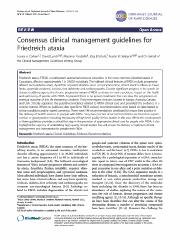Please use this identifier to cite or link to this item:
https://ahro.austin.org.au/austinjspui/handle/1/12772| Title: | Consensus clinical management guidelines for Friedreich ataxia. | Austin Authors: | Corben, Louise A;Lynch, David;Pandolfo, Massimo;Schulz, Jörg B;Delatycki, Martin B | Institutional Author: | Clinical Management Guidelines Writing Group | Affiliation: | Bruce Lefroy Centre, Murdoch Childrens Research Institute, Parkville, 3052, Victoria, Australia Department of Neurology, Children's Hospital of Philadelphia, Pennsylvania, USA Laboratory of Experimental Neurology, Université Libre de Bruxelles, Brussels, Belgium. Department of Neurology, University Hospital, Aachen, Germany. |
Issue Date: | 30-Nov-2014 | Publication information: | Orphanet Journal of Rare Diseases 2014; 9(): 184 | Abstract: | Friedreich ataxia (FRDA), a multisystem autosomal recessive condition, is the most common inherited ataxia in Caucasians, affecting approximately 1 in 29,000 individuals. The hallmark clinical features of FRDA include progressive afferent and cerebellar ataxia, dysarthria, impaired vibration sense and proprioception, absent tendon reflexes in lower limbs, pyramidal weakness, scoliosis, foot deformity and cardiomyopathy. Despite significant progress in the search for disease modifying agents, the chronic progressive nature of FRDA continues to have a profound impact on the health and well-being of people with FRDA. At present there is no proven treatment that can slow the progression or eventual outcome of this life-shortening condition. Thirty-nine expert clinicians located in Europe, Australia, Canada and USA critically appraised the published evidence related to FRDA clinical care and provided this evidence in a concise manner. Where no published data specific to FRDA existed, recommendations were based on data related to similar conditions and/or expert consensus. There were 146 recommendations developed to ensure best practice in the delivery of health services to people with FRDA. Sixty-two percent of recommendations are based on expert opinion or good practice indicating the paucity of high-level quality clinical studies in this area. Whilst the development of these guidelines provides a critical first step in the provision of appropriate clinical care for people with FRDA, it also highlights the urgency of undertaking high-quality clinical studies that will ensure the delivery of optimum clinical management and intervention for people with FRDA. | Gov't Doc #: | 25928624 | URI: | https://ahro.austin.org.au/austinjspui/handle/1/12772 | DOI: | 10.1186/s13023-014-0184-7 | Journal: | Orphanet journal of rare diseases | URL: | https://pubmed.ncbi.nlm.nih.gov/25928624 | Type: | Journal Article |
| Appears in Collections: | Journal articles |
Files in This Item:
| File | Description | Size | Format | |
|---|---|---|---|---|
| 25928624.pdf | 453.15 kB | Adobe PDF |  View/Open |
Page view(s)
100
checked on Nov 19, 2024
Download(s)
104
checked on Nov 19, 2024
Google ScholarTM
Check
Items in AHRO are protected by copyright, with all rights reserved, unless otherwise indicated.
